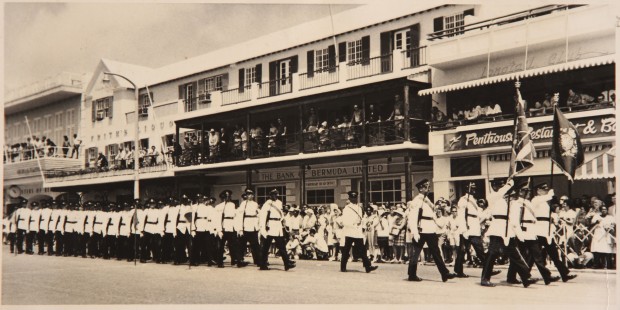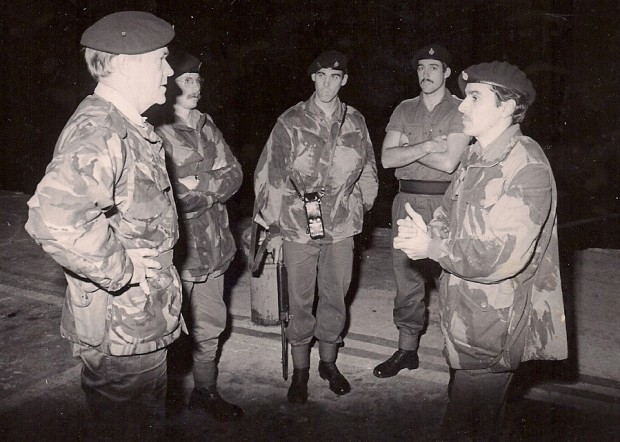Bermuda Regiment Celebrates 50 Years Today
The Bermuda Regiment today celebrates its 50th birthday, as September 1 marks the day the Island’s modern armed service was created out of the Bermuda Militia Artillery [BMA] and the Bermuda Volunteer Rifle Corps [BVRC].
And Regiment Commanding Officer Lt Col Michael Foster-Brown said the Regiment would continue to have its sights fixed on the future as well as celebrating its rich history.
Col Foster-Brown added, “The reach of the Regiment is far and wide with over 11,000 Regimental numbers having been issued and we’re conscious that the success of the Regiment has been built on those who have served before us, so the reunion theme of the year long series of celebrations is very appropriate.”
Bermuda Regiment Queen’s Birthday Parade in 1966, photo courtesy of Bermuda Regiment
Col Foster – Brown said the delivery of British Army issue SA-80 rifles earlier this month, which will replace the ageing current issue Mini Ruger 14s, some of which are 30 years old, was a visible sign of the progress and investment in the Regiment.
He added, “These alone will make a big difference to our capabilities.”
Col Foster Brown said that a new State Partnership Programme with the US National Guard and the training of soldiers as Special Constables alongside the Bermuda Police Service would further enhance the Regiment’s ability to perform its disaster relief and internal security roles.
He added, “This going forward will offer the Regiment exchanges and support, even more training opportunities.”
The Regiment has already put on a series of events to celebrate its golden anniversary under the BR50 banner and more are planned – including an international military tattoo to be held in October and a home coming service at Warwick Camp on Sunday, September 20.
Col Foster-Brown added, “We’ve also had the honour of being awarded the Freedom of St George’s and we look forward to the Freedom of Hamilton in November.”
And a special open night for potential recruits to the Regiment, which had a record number of volunteers last year, will be held next month on Saturday, September 19.
Briefing on Front Street during 1977 riots. Left to right – Lt. Col. Brendan Hollis 2/Lt. Rick Barton, 2/Lt. Allan Rance, 2/Lt. Wendell Hollis, Capt. John Bento
Col Foster Brown added, “More and more people are choosing stay in the Regiment so we can make the next Recruit Camp smaller, which opens up the prospect of an all-volunteer Recruit Camp for the first time. Anyone interested a fun, rewarding, adventurous and challenging experience as a soldier is invited to attend.”
And he said, “We argue Regiment service makes people better citizens and better employees as it develops self-discipline, teamwork and leadership skills.
“I believe that if two people apply for a job and one has Regiment service they will have an advantage because he or she has proved they are reliable, hardworking and can deal with new challenges.”
He added that soldiers also benefited from opportunities for overseas travel and free bus and ferry travel.
He said, “They also get discounts in a large range of stores – a way businesses kindly show their appreciation of what the Regiment does.
“That was self-evident last October when the Regiment helped get the country back on its feet again after the hurricanes.”
Col Foster-Brown added that soldiers leaving service also get a testimonial outlining the skills and qualities they have developed.
And he said, “We are intensely proud of our traditions and those of our predecessor Regiments, which saw service in two World Wars, but we’re not resting on our laurels.
“The Regiment is trained, adaptable and ready to handle whatever the next 50 years throws at us. We have much to celebrate and I thank serving and former soldiers for their service, dedication and loyalty.”
“The modern Regiment preserves the golden thread linking military units on the Island from the first days of colonisation to the formation of the BMA and the BVRC in 1895 and beyond,” the Regiment said.
“Other units were raised at various times, including the Bermuda Militia Infantry [BMI], Bermuda Home Guard and Bermuda Volunteer Engineers [BVE].
“Both the BMA and the BVRC served overseas in both World Wars – with many soldiers from both units paying the ultimate price.
“The BMA served in the Royal Garrison Artillery and the BVRC served in the 1st Battalion Lincolnshire Regiment in World War I, with more than 100 Bermudian troops losing their lives.
“Battle honours were earned throughout the European campaign and many were conspicuous in their service, with Bermuda’s soldiers earning, amongst other commendations, the Military Medal.
“During the Second World War the BMA were the Bermuda Contingent of the 1st Caribbean Regiment which served in North Africa and Europe.
“The BVRC served as a company in the Royal Lincolnshire Regiment in Britain and Europe. Of the 184 Bermudians serving overseas, 35 died. Many were highly decorated for their valour, including a George Cross.
“At home, the BMI and BVE, along with those who remained of the BVRC and BMA, guarded the Island.
“The BMA were re-equipped and trained as infantry in 1953 although they retained their Royal Artillery allegiance, uniform and badge. But, along with the social changes of the 1950s and 1960s, the two units were poised for change.
“The BMA and what was by then the Bermuda Rifles officially became one in a ceremony on November 23, 1965 and the amalgamated infantry battalion adopted the histories and characteristics of the predecessor units, although battle honours were not carried forward to the Colours and drums of the Regiment.
“The Regiment saw service in civil disturbances in the first 15 years of its life and has been regularly embodied to support civil authorities after hurricane strikes – twice in the space of a week last year after Hurricanes Fay and Gonzalo hit in quick succession.
Bermuda Regiment training at Camp Lejuene in North Carolina earlier this year:
Lt Col Eugene Raynor, now Honorary Colonel of the Regiment, signed up with the BMA in 1961, was commissioned in 1964 and was one of the modern force’s first officers on amalgamation.
Col Raynor rose to command the Regiment between 1980-84 – its first black Commanding Officer.
He said, “The outward appearances have changed several times, in terms of size but the systems haven’t really changed. That’s a good thing since from the start, Recruit Camp has been very effective.
“The role hasn’t changed either, but the things we do to maintain that role have changed slightly in the terms of the details of internal security training. It’s been progressive. Another thing to influence that is our personnel change-over so regularly. And we’re always being kept up to date by people seconded to us by the British Army.”
But Col Raynor added, “Our traditions have been maintained to the greatest extent and maintained well.”




Make the Regiment full time.
Now that is funny or a stupid statement.
We’d all be employed.
Get it?
If that is the case make it much much smaller. Enough for the band, some sort of honour guard for ceremonies & a small contingent to suppliment the BPS.
Leave initial hurricane cleanup to the construction companies & the landscapers. They have the equipment & the know how to get roads clear using fewer people in less time than the Regiment ever did.